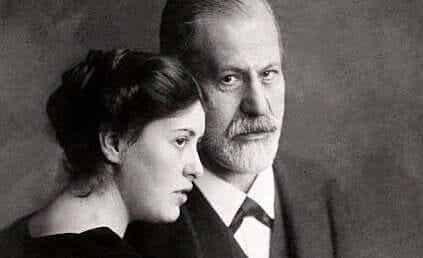Envy, accompanied by self-deception, is a feeling that can cause significant emotional wear. In this article we propose the opinion of the experts in this regard.

Last update: May 30, 2020
The history of humanity shows us that we are social beings. From the appearance of the first hominids to the development of different species, men and women come together to live together. Our emotional environment underlies the functioning of social networks. With this in mind, is envy natural? We will try to give an answer in the next lines.
The discovery of fire not only allowed us to be able to see in dark nights, to protect ourselves from the cold or to cook meat. He also produced the custom of encounters around a bonfire, favoring contact, closeness, gazes and the birth of the first gutturalisms as a primitive form of dialogue.
Vulnerability and resilience (the ability to stand up in the face of adversity) are constructions that acquire meaning in this context. They give birth to a choreography that moves from stability to the most disruptive instability and, of course, to change. And not only this, they lead people to develop actions based on the different meanings attributed to the events that occur in their experience of life. But why is it possible to feel envy in such a dynamic? Let's find out ...
The games of communication
It is in this choreography that different communication games develop: personality styles, the characteristics of each interlocutor, the form of verbal, paraverbal or non-verbal expression; the context in which the dialogue takes place and the content of the conversation.
Within human communication, therefore, nutritious and affective interactional games coexist, as well as those that possess extreme toxicity.
When two people try to communicate, communication rules take over and develop as the dialogue evolves. However, when the number of interlocutors increases, so does the complexity, and the whole is more exposed to misunderstandings.
Among these games, the triangular ones (consisting of three people) prove to be lethal. Alliances are established which turn into a coalition against the third. The famous two against one, in which the third will have to endure the segregation and discredit of the other two: anger, abuse, insults, manipulations, irony, provocations, etc. It is undoubtedly a toxic game.
An example of a threesome is jealousy. The relationship between two is hindered by a real or imaginary third, so one of the two feels downgraded, as he believes that the partner maintains certain emotional relationships with another person. This dynamic generates anguish, guilt, aggression, anger, despair and other toxic feelings.
Feeling envy, the anatomy of a capital sin
Feeling envy is among the worst-case scenarios. Catholicism, in fact, considers envy as one of the seven deadly sins along with lust, gluttony, sloth, greed, pride and anger.
This dark feeling is unleashed when the successes and achievements of a known or unknown person show the envious his inability or aptitude to achieve that result.
The latter, therefore, implements a series of disqualification strategies towards the envied in an attempt to destroy it. He feels so small, so powerless in the face of the success of others, that he feels the need to undermine him to belittle him and leave him on his knees to be able to feel superior.
Well, feeling envious doesn't just mean wanting what others have. True envy is marked by the desire that the envied person does not possess what he has, that his success is not real.
Thus understood, it can be concluded that envy is the mother of resentment, a feeling that does not want the other to do better, but rather the opposite. The envious becomes the satellite of the envied and keeps his pain within himself, since if he expressed it he would declare his inferiority of him.
Envy is the feeling of contempt because one does not have something, but also the desire to possess that something to the point of depriving the other.
The role of the envied person
Often the envied person is not even aware of the painful feelings of the envious. Nobody says "I envy you!" The envious person tries to hide their emotions and prefers not to show their limit and operate with sarcasm and devaluation towards the success of others. Expressing or showing envy would already be a sign of health.
In the professional field, when the boss envies a subordinate (the superior over the inferior), the envious behaviors are more complex and intricate, especially when the subordinate is cute, attractive and intelligent, all virtues that in the eyes of the envious are amplified.
One of the strategies of the envious is to emphasize that the successes of the envied are due to political knowledge, because he attends a superior or because behind his appearance as an intelligent person, he hides a family drama. For example, an envious footballer never misses an opportunity to criticize a colleague's style or even give him a good kick by making it look like an accident.
Envy involves disrespecting distance or emotional closeness. Furthermore, envy between friends or siblings represents a double bet on such dark feelings. Feeling envy triggers the desire for the envied person's opponent to win the prize, play better, be chosen for a job, or pass an exam.
Feeling envy in this way is lustful and treacherous; because while the envious pretends to be happy with his friend's results, behind his back he deeply desires him to fail. Behind his compliments, therefore, lies a desire for destruction.
Mischievous joy
Envy is linked to a malicious, dishonest and immoral attitude, feelings that are the basis of the strategies to annihilate the envied. The envious person tries in every way to convince himself that the success of the envied person is not such and devalues and belittles both the person and the content of her success. He might say: "he has more luck than ability", "he is not as intelligent as he seems"; «Surely his success will not last long ...» or «it's all smoke and no roast!».
If the envious comes to believe what he says about the envied, he deceives himself and that probably makes him feel better, although it is not about genuine well-being.
However, the epicenter of the joy of the envious person lies in the failure of the envied person, if he does not carry out his plans, if he gets disapproval, falls into depression, he is refused the publication of an article; they prefer a co-worker or any situation that shows their defeat.
Feeling envy often leads to self-deception.
Self-deception
In these cases, the silent wishes of the envious come true and here he feels above the envied, because he sees himself as superior and recovers his low self-esteem (although it is a false personal evaluation, not authentic and profound). This gloating and joy at the failure of others is called malicious joy.
One of the most manipulative attitudes of the envious - as a sign of his falseness and irony - is expressed when the enemy, sad for his failure, approaches him amicably and in full interior enjoyment. He shows pain and offers words of comfort: "What a pity that it went wrong ..." or "it's terrible, you don't know how much I understand you."
When a person feels envy, he is invaded by an irrepressible and uncontrollable feeling: speaks ill of the envied or tries to cause him any kind of damage by denying him something, marginalizing him, slandering him, offending him; psychologically or physically abusing them, using sarcasm, mockery, irony or double entenders.
To feel admiration rather than envy
Even if we are not chronic envious, surely at some point in our life we have experienced this emotion, as it is deeply rooted in human nature.
Well, behind envy, hides a person with low self-esteem who, instead of giving value to himself, takes the trouble to despise others to feel better. However, this precarious form of evaluation leads nowhere in terms of self-esteem, it only reinforces the devaluation.
The truth is, if an envious person realizes their real problem, they will likely stop feeling envious. It is truly amazing how a feeling as complex as envy can be stronger than admiration for the other.
The latter is a noble and clean feeling, a healthy way to enhance and highlight the results of the partner, friend, relative. It allows you to express it and let them know. It is also an easy, simple, not complex feeling; but to prove it we must feel good about ourselves, we must esteem ourselves and be willing to positively evaluate the results of others.
Admiration allows us to ask the other what he has done to achieve that result and thus obtain the formula for success.


























